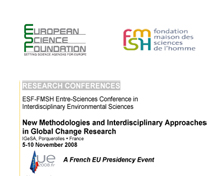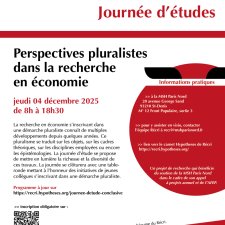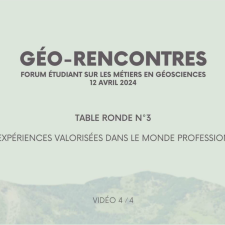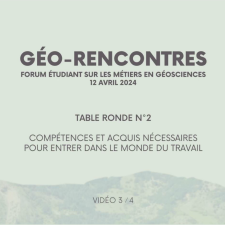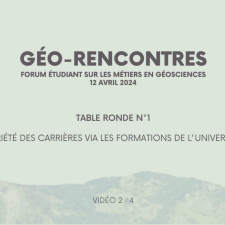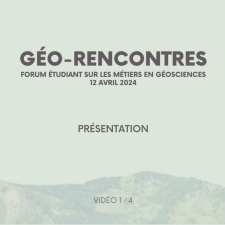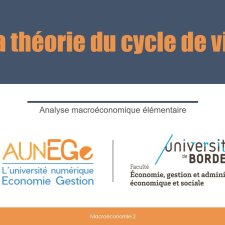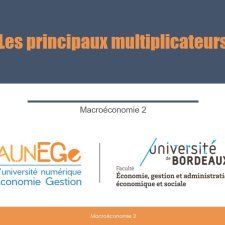Notice
The Costs of Strategic Adaptation in a Simple Conceptual of Climate Change
- document 1 document 2 document 3
- niveau 1 niveau 2 niveau 3
Descriptif
A simple theoretical model of the process of strategic adaptation to climate change is proposed. Climate change is represented by a non-stationary Markov process on the space of climate states, and strategic adaptation by a simple resource allocation task in which agents incur costs when moving resources from one activity to another. A stationary analysis allows diagnostics that quantify the net costs of climate change, and the long-run benefits to adaptation, to be defined. A full dynamic analysis of the model 74 allows for the computation of the costs of negotiating the transition between two stationary climate regimes. We analyze the dependence of these adaptation costs on the behavioural parameters of the model, and the costs of adjusting resources from one activity to another. We find that adaptation costs have a complex and counterintuitive dependence on adjustment costs, and can be more sensitive to the details of the climate change process than adaptation benefits are. This has important implications for adaptation planning, and understanding the linkages between adaptation and climate change mitigation.
Dans la même collection
-
Long Term Climate Variability: from Past to Future and from Data to Models
GuiotJoëlData show that climate has always changed in the past, sometimes with a larger amplitude than what we experimented for two decades. But the main signatures of the anthopogenic forcing are the speed of
-
Detection and Attribution of Climate Change to Different Causes
PlantonSergeAccording to the last IPCC report, the most part of the observed increase in globally averaged temperatures since the mid-20th century is very likely due to the observed increase in anthropogenic
-
Setting Cumulative Emissions Targets to Reduce the Risk of "Dangerous" Climate Change
ZickfeldKirstenThe ultimate objective of climate change mitigation is to reduce the amount of anthropogenic greenhouse gas (GHG) emissions in order to achieve “stabilization of greenhouse gas concentrations in the
-
Debate
CiaisPhilippeSeguinBernardChauvinDominiqueThe European Science Foundation (ESF) and the French Foundation of the Maison des Sciences de l’Homme (FMSH) (within the Entre-Sciences programme) have agreed to jointly develop a new conference
-
The Intergovernmental Panel on Climate Change and the Challenges of Climate policy, Equity and Ethi…
SomervilleRichardThe 2007 Intergovernmental Panel on Climate Change (IPCC) report provides clear guidance for the greenhouse gas emissions reductions needed to limit global warming to specific targets such as 2 °C
-
Climatic Hazard Mitigation Through Risk and Resilience Committees in Nepal
Raj AryalKomalNepal lies in an ecologically fragile and seismic region with a history of devastating Glacier Lake Outburst Flood (GLOF), landslides and earthquakes. Increases in temperature could increase the
-
Debate
BergerA.GuiotJoëlMannMichael E.DanisPierre-AlainAmatoVincenzoThe European Science Foundation (ESF) and the French Foundation of the Maison des Sciences de l’Homme (FMSH) (within the Entre-Sciences programme) have agreed to jointly develop a new conference
-
The State of UK Climate Modelling
FisherJoshuaThe UK recently invested £23 million (~US$40 million) in a program in Quantifying and Understanding the Earth SysTem (QUEST). The final product of this investment is the state-of-the-art QUEST Earth
-
Climate, Geography and Macroeconomics: Revised Data, Refined Analysis and New Findings
FüsselHans-MartinAssessments of social and economic impacts of climate change are primarily based on the results of biophysical climate impact models, which are aggregated, extrapolated and/or valued in monetary terms
-
The Effect of Thermal Pollution on Benthic Foraminiferal Assemblages, in the Mediterranean Shore Fa…
ArieliRuthieOver the past several decades public and scientific awareness to global warming has increased significantly. As a result, many studies have examined the affects of global warming. However, the
-
International Negociations on Climate Change: How to Take Advantage of Risk Aversion to Improve the…
ThoronSylvieClimate change is one of the best examples of global environmental problems. Countries are conscious that they have to find a solution to this global problem at the international level. Negotiations
-
IPCC Working Group II
ChanzyAndréThe European Science Foundation (ESF) and the French Foundation of the Maison des Sciences de l’Homme (FMSH) (within the Entre-Sciences programme) have agreed to jointly develop a new conference
Avec les mêmes intervenants et intervenantes
-
Debate
DjédjéOkoubi Franck DidierMillnerAntonyRaj AryalKomalFragnièreAugustinThe European Science Foundation (ESF) and the French Foundation of the Maison des Sciences de l’Homme (FMSH) (within the Entre-Sciences programme) have agreed to jointly develop a new conference
Sur le même thème
-
Journée d’étude | Récri : Perspectives pluralistes dans la recherche en économie - PARTIE 1
MofakhamiMaloMéryFlorianAu cours de ces bientôt deux ans de séminaire, les séances mensuelles du Récri ont été l’occasion de mettre en évidence la diversité et la richesse des recherches en économie menées par des jeunes
-
Journée d’étude | Récri : Perspectives pluralistes dans la recherche en économie - PARTIE 2
TailleurGabrielMalherbeLéoCastelanelliBenjaminRosano-GrangeMarlèneRosElodieGononMorganeTosoliniMarionBétouleAliceGrangerayJonasBouffangeAlbertAu cours de ces bientôt deux ans de séminaire, les séances mensuelles du Récri ont été l’occasion de mettre en évidence la diversité et la richesse des recherches en économie menées par des jeunes
-
Géo-Rencontres 2024 / Les expériences valorisées dans le monde professionnel
LilloEmmaAraujoJulieHuartFlorianDubreuRomainBuquetDamienChazalLauraBorieMarianeForum sur les métiers en géosciences organisé par les étudiants du CMI Ingénierie Géologique et Civile, Université de Bordeaux, 12 avril 2024
-
Géo-Rencontres 2024 / Compétences et acquis nécessaires pour entrer dans le monde du travail
BrinonJulietteAmoleFili-FenuaPretouFrédéricCampetHugoLiébauxAlbinDe AlemeidaMarie-LouPoirierAymericDufrenoyAudreyForum sur les métiers en géosciences organisé par les étudiants du CMI Ingénierie Géologique et Civile, Université de Bordeaux, 12 avril 2024
-
Géo-Rencontres 2024 / Variété des carrières via les formations de l'université
InguimbertDianeLacazeRomaneLemaitreLaurieChazalLauraMontjeanPascalPoudevigneJacquesPortefaixFrédéricForum sur les métiers en géosciences organisé par les étudiants du CMI Ingénierie Géologique et Civile, Université de Bordeaux, 12 avril 2024
-
Géo-Rencontres 2024 / Présentation
LatasteJean-FrançoisLavieThéoForum sur les métiers en géosciences organisé par les étudiants du CMI Ingénierie Géologique et Civile, Université de Bordeaux, 12 avril 2024
-
Tokyo, plus grande « ville » au monde : aménager et gouverner la démesure
Languillon-AusselRaphaëlAvec ses quelques trente-cinq millions d’habitants, Tokyo est la « ville » la plus peuplée au monde, et l’une des métropoles les plus riches. Cette présentation vise à décrire, analyser et expliquer,
-
Demande en biens et services et fluctuations conjoncturelles
Maveyraud-TricoireSamuelDemande en biens et services et fluctuations conjoncturelles
-
-
-
Les propensions à consommer et à épargner
Maveyraud-TricoireSamuelLes propensions à consommer et à épargner
-
Le marché des biens et services à court terme
Maveyraud-TricoireSamuelLe marché des biens et services à court terme


